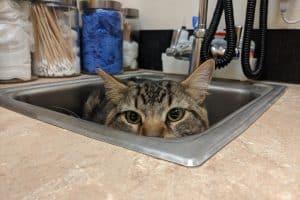Is your cat acting strangely and seem to be on edge? Many cat owners find themselves wondering why their feline friends exhibit paranoid behavior. Understanding the reasons behind this mysterious behavior can help you better care for your cat and provide a more enriching environment for them to thrive in.
Cats can exhibit paranoid behavior due to various reasons such as stress, anxiety, fear, illness, or simply their natural instincts.
Environmental Factors
Is your feline friend acting more on edge than usual? There could be environmental factors at play that are triggering their paranoid behavior. Changes in the environment such as loud noises, new smells, or unfamiliar surroundings can make your cat feel anxious and paranoid. Make sure to provide a safe and comfortable space for your cat to retreat to when they feel overwhelmed. Additionally, creating a consistent routine can help alleviate their stress and provide a sense of stability.
If you have recently moved to a new home or rearranged furniture, this change could be causing your cat to feel insecure and paranoid. Introducing new stimuli gradually can help your cat adjust and feel more secure in their surroundings. Providing enrichment activities such as scratch posts, toys, and perches can also help alleviate stress and prevent paranoid behavior.
For more insights on how the environment can impact your cat’s behavior, you can check out this helpful resource on creating a cat-friendly home: Cat-Friendly Home Tips.
Socialization and Behavior
Have you noticed your cat acting skittish or avoiding interactions with humans and other animals? Your cat’s socialization and behavior can greatly impact their overall demeanor and tendency towards paranoia. Cats that have not been properly socialized from a young age may be more prone to feelings of anxiety and paranoia in new or unfamiliar situations.
Positive interactions with humans and other animals early on can help your cat feel more secure and confident in their environment. If your cat is displaying signs of paranoid behavior, it’s important to provide a calm and reassuring presence to help them feel safe.
An additional unique insight to consider is the role of play in your cat’s behavior. Engaging your cat in interactive play sessions can help build their confidence and alleviate stress. Providing mental stimulation through play can also prevent boredom and reduce feelings of paranoia.
Remember, understanding your cat’s behavior and providing a secure and enriching environment are essential in addressing paranoid tendencies. Take the time to observe your cat’s behavior and make adjustments as needed to ensure their well-being.
Health Concerns
If your cat is acting paranoid, it could be a sign of underlying health issues. Cats are masters at hiding discomfort, so changes in behavior like paranoia could be their way of telling you something isn’t right. To rule out any physical problems, it’s crucial to consult with a veterinarian. Health conditions such as hyperthyroidism, dental pain, or neurological issues can sometimes manifest as anxious or paranoid behavior in cats. Remember, your vet is the best person to diagnose and treat any health concerns your feline friend may have. Don’t delay in seeking professional help if you suspect your cat’s paranoia is related to a health issue.
Play and Enrichment
Providing your cat with adequate mental and physical stimulation through play and enrichment can work wonders in reducing paranoid behavior. Cats are intelligent and curious creatures that need mental challenges and physical exercise to thrive. Interactive toys, puzzle feeders, and regular play sessions can help keep your cat engaged and content. Creating a stimulating environment with scratching posts, climbing towers, and hiding spots can also provide your feline friend with a sense of security and fulfillment. Remember, a well-enriched environment can go a long way in keeping your cat’s anxiety at bay.
Additional Unique Insight:
Try incorporating scent enrichment into your cat’s environment. Cats rely heavily on their sense of smell, so introducing new scents like catnip, valerian, or silver vine can help reduce stress and anxiety. Consider using scent diffusers, toys infused with calming scents, or simply providing fresh herbs for your cat to explore.
Remember, a happy and fulfilled cat is less likely to exhibit paranoid behavior. With a bit of effort and creativity, you can create a stimulating environment that helps your feline friend feel safe and secure.
Routine and Stability
Maintaining a consistent routine and stable environment is crucial for reducing your cat’s anxiety and paranoia. Cats thrive on predictability, so try to feed them at the same time every day, keep their litter box in the same spot, and provide them with a comfortable and safe space to retreat to when they need to feel secure. Changes in their environment or daily schedule can trigger feelings of paranoia, so do your best to establish a routine that your cat can rely on.
Bonding and Trust
Exploring ways to strengthen your relationship with your cat through bonding activities can help alleviate their paranoia. Spend quality time playing with your cat, grooming them, or simply sitting quietly together. Building trust with your feline friend can help them feel more secure and reduce their anxiety levels. Remember, a happy and bonded cat is less likely to exhibit paranoid behaviors. Have patience and take the time to develop a strong connection with your furry companion.
- Provide plenty of interactive toys and engaging activities to keep your cat stimulated and mentally engaged.
- Consider using pheromone diffusers or calming collars to help create a relaxed environment for your cat.
- Ensure your cat has access to high perches or hiding spots where they can observe their surroundings from a safe vantage point.
- Incorporate positive reinforcement training techniques to build your cat’s confidence and trust in you.
- Regular veterinary check-ups can rule out any underlying health issues that may be contributing to your cat’s paranoia.
Remember, every cat is unique, so experiment with different strategies to see what works best for your feline companion. By prioritizing routine, stability, bonding, and trust-building activities, you can help your cat feel more secure and confident in their environment.
Unique Cat Personalities
Understand that each cat is an individual with their own unique personality traits that may influence their behavior and level of paranoia. Just like humans, cats can have different temperaments, with some being more skittish or anxious by nature. Factors such as past experiences, environment, and even their breed can all play a role in their levels of paranoia.
Interesting Fact: Did you know that some cat breeds are more prone to anxiety and paranoia than others due to their genetic predispositions? Breeds such as Siamese, Burmese, and Himalayan cats are known to be more sensitive and can exhibit higher levels of anxiety compared to others.
Factors Influencing Paranoia in Cats
There are various factors that can contribute to your cat acting paranoid. Changes in their environment, such as a new family member, moving to a new house, or loud noises, can trigger anxiety and make them more cautious. Additionally, past trauma, lack of socialization, or even health issues could also play a part in their behavior. Understanding what triggers your cat’s paranoia can help you provide the necessary support and create a safe environment for them.
- Environment: Changes in their surroundings can cause stress and trigger paranoid behavior in cats.
- Past Trauma: Cats who have experienced trauma in the past may be more prone to anxiety and paranoia.
- Health Issues: Underlying health conditions could also be a reason for your cat’s anxious behavior.
- Lack of Socialization: Cats that were not properly socialized as kittens may exhibit more paranoid behaviors.
Remember, patience and understanding are key when dealing with a paranoid cat. Providing them with a safe space, regular routine, and plenty of love and attention can help ease their anxiety over time.
(Additional Resource: American Association of Feline Practitioners – Understanding Feline Behavior)
Alex, a passionate animal lover, has experience in training and understanding animal behavior. As a proud pet parent to two dogs and three cats, he founded AnimalReport.net to share insights from animal experts and expand his knowledge of the animal kingdom.









